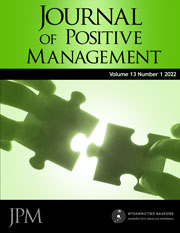Knowledge And Relational Competences In Virtual Organisations
DOI:
https://doi.org/10.12775/JPM.2022.004Abstract
Purpose: The purpose is to identify the impact of knowledge and building relational competences on the process of creating virtual organizations (VOs).
Methodology: The study included companies operating in Poland. The data was collected through personal interviews. A personal interview questionnaire was used as a research tool. The questions about the value of knowledge in VOs were constructed in a way that reflected the nature of VOs. The study was conducted in 2018.
Findings: The study’s findings indicate that one of the main drivers of collaboration inside a VO is the desire to learn new things through learning with partners. The growth of human resources, the exchange of experience, and the learning of new knowledge are the three most significant advantages of collaboration in a VO, in addition to the financial gains. In the process of developing a VO, relational competences are built with the use of appropriate knowledge resources, which also have an impact on the effectiveness of collaboration. Reflection on shared learning occurs in a company’s future relationships with the environment. The competitive position is improved through expanded knowledge resources and improved relational competencies. The greatest enabling and restricting factors for the creation of VOs are knowledge and experience, respectively.
Originality/value: The study’s empirical findings support the idea that having access to the right knowledge resources is essential for developing relational competences throughout the virtual organization of economic activity.
Keywords: virtual organisation, knowledge, cooperation, relational competences
Paper type: Research paper
Downloads
Published
How to Cite
Issue
Section
License
Copyright (c) 2023 Urszula Słupska

This work is licensed under a Creative Commons Attribution-NoDerivatives 4.0 International License.
Copyright
Articles submitted to the journal should not have been published before in their current or substantially similar form, or be under consideration for publication with another journal. Authors submitting articles for publication warrant that the work is not an infringement of any existing copyright and will indemnify the publisher against any breach of such warranty. For ease of dissemination and to ensure proper policing of use, papers and contributions become the legal copyright of the publisher unless otherwise agreed.
Plagiarism and ghostwriting
In response to the issue of plagiarism and ghostwriting the editors of the Journal of Positive Management has introduced the following rules to counteract these phenomena:
1. Contributors should be aware of their responsibility for a content of manuscripts.
2. Collective authors are obliged to reveal the contribution and an affiliation of each author (i.e. who is an author of specified part of a paper).
3. Any act of dishonesty will be denounced, the editors will inform appropriate institutions about the situation and give evidence of all cases of misconduct and unethical behaviour.
4. The editors may ask contributors for financial disclosure (i.e. contribution of specified institutions).
Stats
Number of views and downloads: 579
Number of citations: 0



